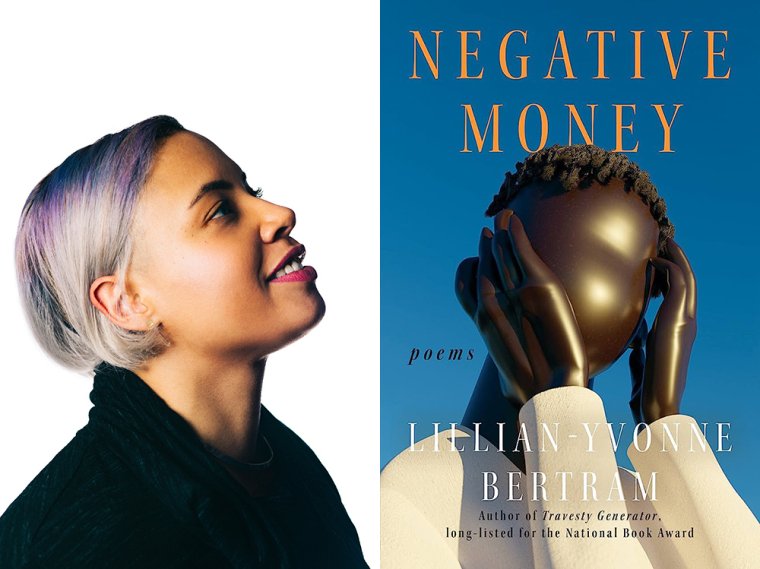This week’s installment of Ten Questions features Lillian-Yvonne Bertram, whose new poetry collection, Negative Money, is out today from Soft Skull Press. In this mix of free verse, prose poems, and experimental forms that make poster-like visual artworks of the page, Bertram explores the meaning of value and how we measure it in dollars and cents; the way we treat one another with care, neglect, or violence; and what mass culture holds up as ideal images and narratives. The poems leap from blunt confession to musical wordplay to high-lyric elocution: “The arrow grazed the doe in the morning, / shaved bare its shoulder,” they write in “Intima.” Surprising juxtapositions characterize the collection, as in the stark contrast of the elegant doe of “Intima” and the speaker’s “cunt / made of deer meat” in the next poem, “Raise Her Dark Matter.” Publishers Weekly writes that Negative Money leaves “the reader with an increased awareness of the fragility, absurdity, and loneliness of the world.... This profound book will stir readers into necessary reflection.” Lillian-Yvonne Bertram is an associate professor of English, Africana studies, and art and design at Northeastern University. They are the author of several poetry collections, including Travesty Generator (Noemi Press, 2019), which won the 2018 Noemi Press Poetry Prize and was a finalist for the National Poetry Series, and Personal Science (Tupelo Press, 2017).

Lillian-Yvonne Bertram, author of Negative Money. (Credit: Adrianne Mathiowetz)
1. How long did it take you to write Negative Money?
Several years, as I didn’t set out to write exactly this book. It is a compilation of poems I’ve written over time, some a decade old or more. I was writing poems and figured that, at some point, they would coalesce into something I could call a book. My preoccupations over time remain the same, so poems several years old still spoke to more recent ones.
2. What was the most challenging thing about writing the book?
Once I had the poems it was challenging to think about what kind of story they could tell, what was missing, what needed to be added or amended. Things I wrote in the past I wouldn’t write today, but I also wouldn’t necessarily change them. Reconciling the different types of writer I have been proved to be more challenging than I expected.
3. Where, when, and how often do you write?
Anywhere I can, really, but also hardly ever! I have been working on other projects for a while, and so anything strictly “creative writing” hasn’t happened in many months. I do a lot of thinking and ideating, so hopefully that counts.
4. What are you reading right now?
E-mail; lots and lots of e-mail. News and other sorts of content. But the most recent book I was reading was Crying in the Bathroom by Erica L. Sanchez.
5. What was your strategy for organizing the poems in this collection?
I tend to organize poems in groups, so there are maybe five or six groups of poems in the book, of four to six poems each, and those groups share similar themes or ideas. I wouldn’t put all the poems in a group one after the other, so it becomes a matter of spreading them all out so that they can still speak to one another, but also to the poems that intervene so that there is interconnectedness among the phantom “sections.” It all falls together rather organically, or so it seems to me.
6. How did you arrive at the title Negative Money for this collection?
I was thinking about how I have far more debt than capital, and how many people can be fully employed but never keep any of the money they earn. That’s most of us. I began to think of this situation, of making money but not actually owning it or being able to keep any of it, as a kind of “negative money.”
7. What is one thing that surprised you during the writing of Negative Money?
I found myself feeling deeply insecure about the work, in part because some of it was written so long ago. I had to rethink how I felt about certain things when I wrote them and consider what they could mean now that my relationship to them is different and now that the world in which they will be read is very different.
8. If you could go back in time and talk to the earlier you, before you started Negative Money, what would you say?
“Develop a consistent writing practice, and just write!”
9. What forms of work, other than writing, did you have to do to complete this book?
I did a lot of revising—a lot—and other kinds of reading. I also spent a lot of time away from the poems, from the book, trying to spend time outside. Again, I don’t think in terms of books exactly, so I don’t write towards the book as a goal, which meant I never sat down and thought, “Okay, here are things I need to do to complete this book: A, B, and C.” The book itself is an arbitrary unit, after the fact. It is born only once there is enough writing.
10. What’s the best piece of writing advice you’ve ever received?
The same piece of advice I give to others but never follow myself: “Just write!” That’s it. I don’t have anything profound to say about it, other than to just write and not bother with these ideas of whether you can or you should or if it’s good or whatever. Just write.







